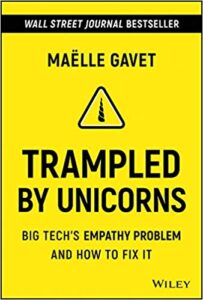In case you haven’t noticed, the big tech companies continue to grow in power. That growth is allowing them to not only generate massive amounts of wealth for investors but also shape society. When I say big tech, I’m not just referring to the public companies that make up what is known as the FAANG group of stocks that includes Facebook, Apple, Amazon, Netflix, Google, and of which I would also include Microsoft. My definition of big tech also includes privately held companies known as “unicorns”, companies that have rapidly went from zero to $1,000,000,000 valuations such as Nextdoor, Udemy, Instacart, SpaceX, Stripe, and the like.
As someone who works in technology, it’s great to see companies in this space have success. However, that success has not come without controversy. The more we learn about how these companies operate, how they make money, and how they exploit their users, the more we should be concerned about the impact they have on the world around us. It’s a multi-faceted problem that Maëlle Gavet explores in her book Trampled by Unicorns: Big Tech’s Empathy Problem And How To Fix It.
The premise of Gavet’s thesis is that big tech has an empathy problem. They have grown without taking responsibility for their impact, whether it’s through the detrimental effect they have on their local communities, their efforts to avoid paying corporate taxes by exploiting loopholes, their operating and hiring practices, or their exploitation of users and their weaknesses. Each of these issues has led to a concentration of wealth and power in the hands of a few companies, creating a class of have’s, those running and building the big tech companies, and the have-not’s, those who are on the outside looking in.
The bigger problem is that the divide between the two classes is growing due to the “winner-take-all” scenario that technology enables. The majority of these big technology companies rely on network effects to achieve their growth targets. Once one company achieves a dominant position, e.g. Facebook in social networking, Amazon in internet retail, Google in search, they are able to crowd out their competitors. Sometimes it is done naturally, and sometimes it is done through predatory business practices.
Gavet’s treatise is comprehensive and covers pretty much all of the angles and issues that are plaguing big tech. But she doesn’t stop there. She goes on to offer her advice, based on her experience in the industry, on what we can do to combat the influence of big tech and to limit its power. While I don’t necessarily agree with all of her recommendations and believe some are either too utopian or not practical, I love that she is willing and bold enough to both take on the problem and offer solutions. In fact, more people need to shine a spotlight on how Big Tech has been permitted to run unchecked and its toll on society.
And while Gavet’s work would make it seem that she is a Luddite who wants us to abandon technology, she is anything but. Her position is summarized best in the book’s summary on her website:
We don’t need less tech, we need more empathetic tech.
I’m sure I will find myself referring back to the book time and again because of how eloquently Gavet makes her points. And while she pushes hard for government regulation of these companies, I believe we’ve passed the point where we can rely on effective government intervention. As users, we need to take control and take matters into our own hands. We need to evaluate and examine our use of technology. We need to resist the tools and algorithms that are exploiting and dividing us. We must rebuild our sense of community and come back together as a more civil society, realizing that we have more in common than we realize. Certainly, government and regulation has its place, but it’s not a panacea and will just revert us back to the status quo if we as users don’t change our actions and habits.
Trampled By Unicorns is a Must Read. For those in technology, it is a must read because it exposes the lack of empathy those inside the industry have for those being overrun by their inventions and how it enables winner take all events that enrich the few at the expense of the many. For those outside technology, it shows the power and control big tech has over our lives, and that we have to take responsibility, and effect change to combat their power and control by changing our behavior and interactions with technology. We must quit enabling their behavior, apologizing for their bad behaviors, and demand change. It’s not a must read because I agree with all her recommendations or am on board 100% with what she professes, but I give her a lot of credit for having the courage to write a book that rightfully takes the industry to task for their lack of empathy and similarly egregious behaviors.

